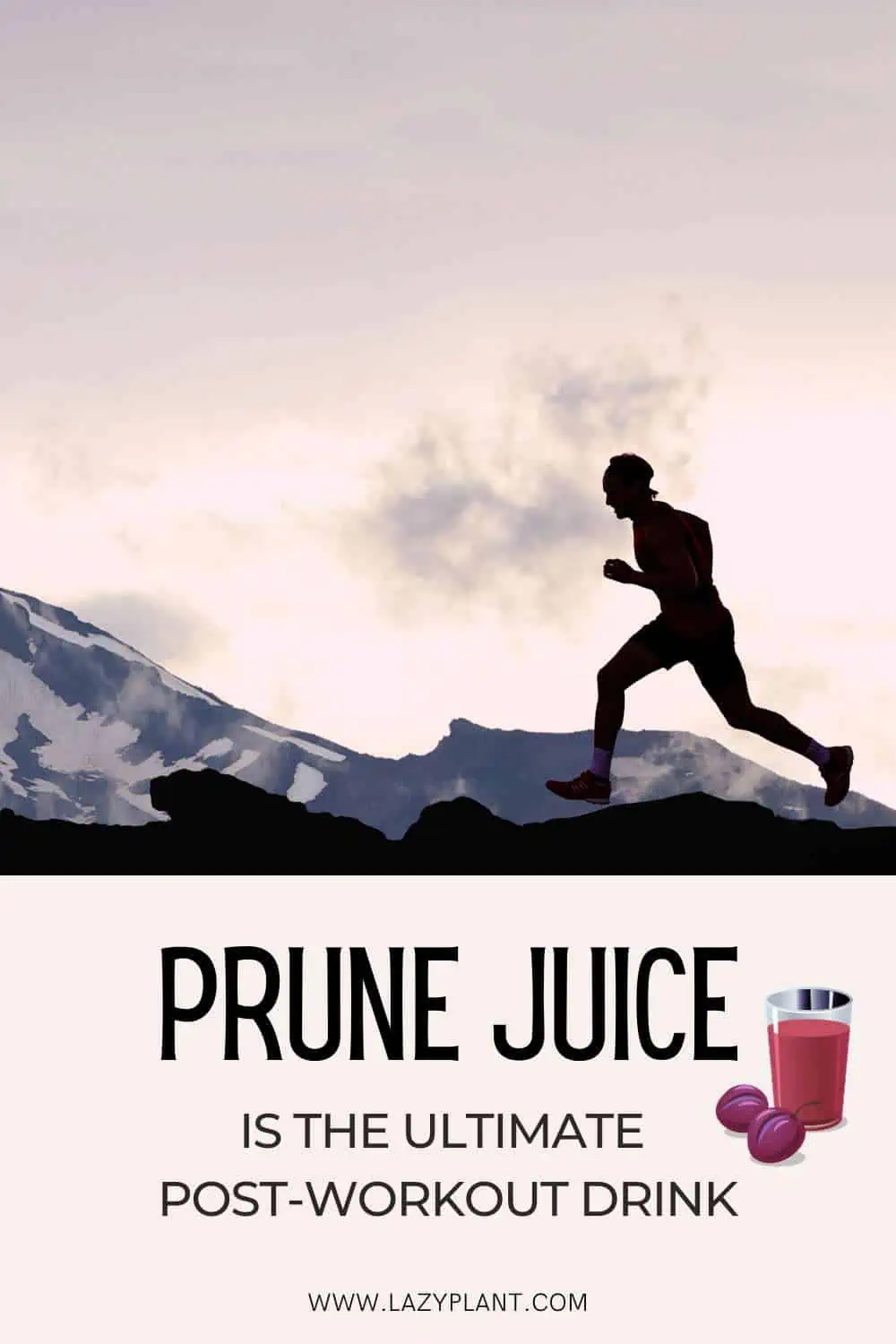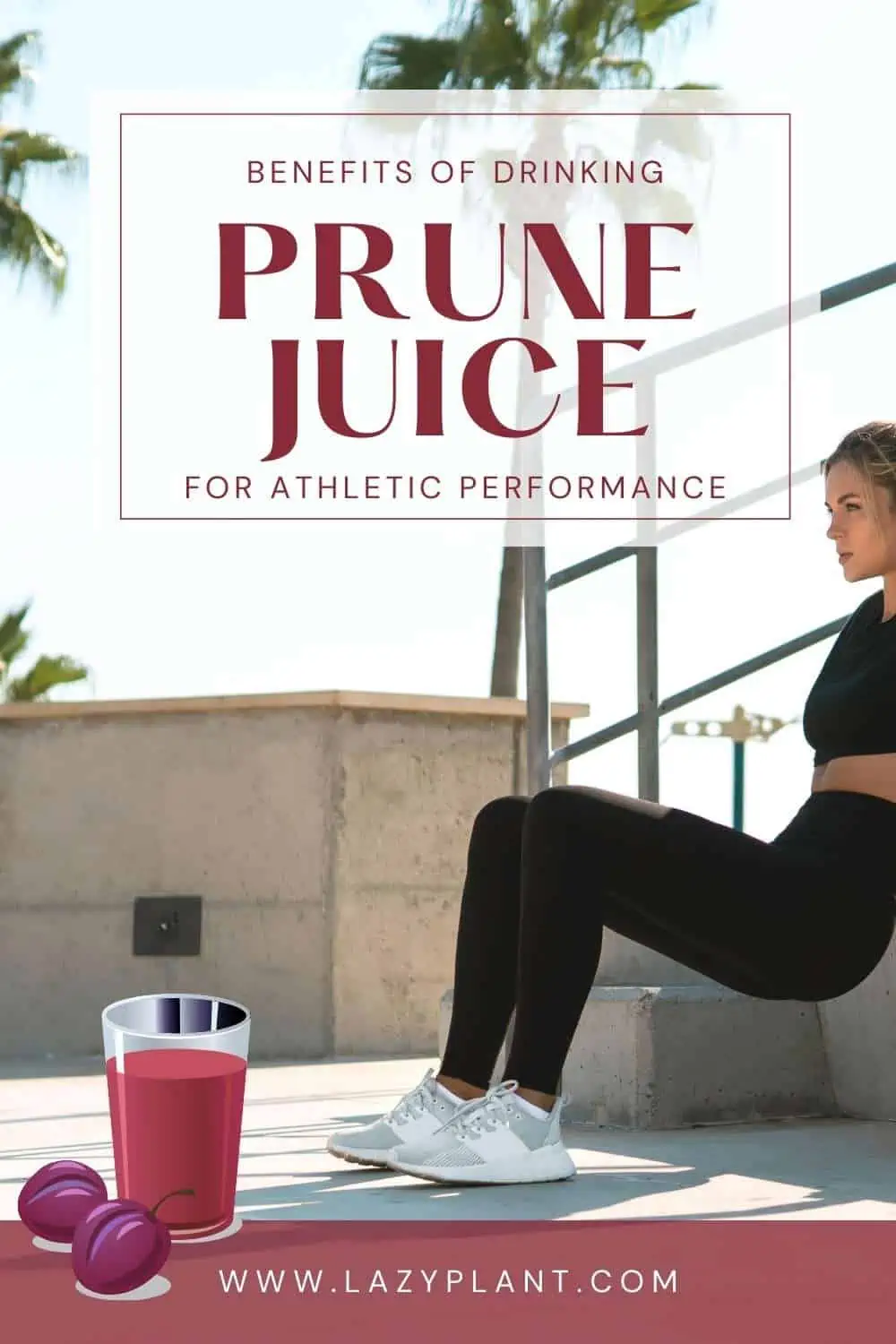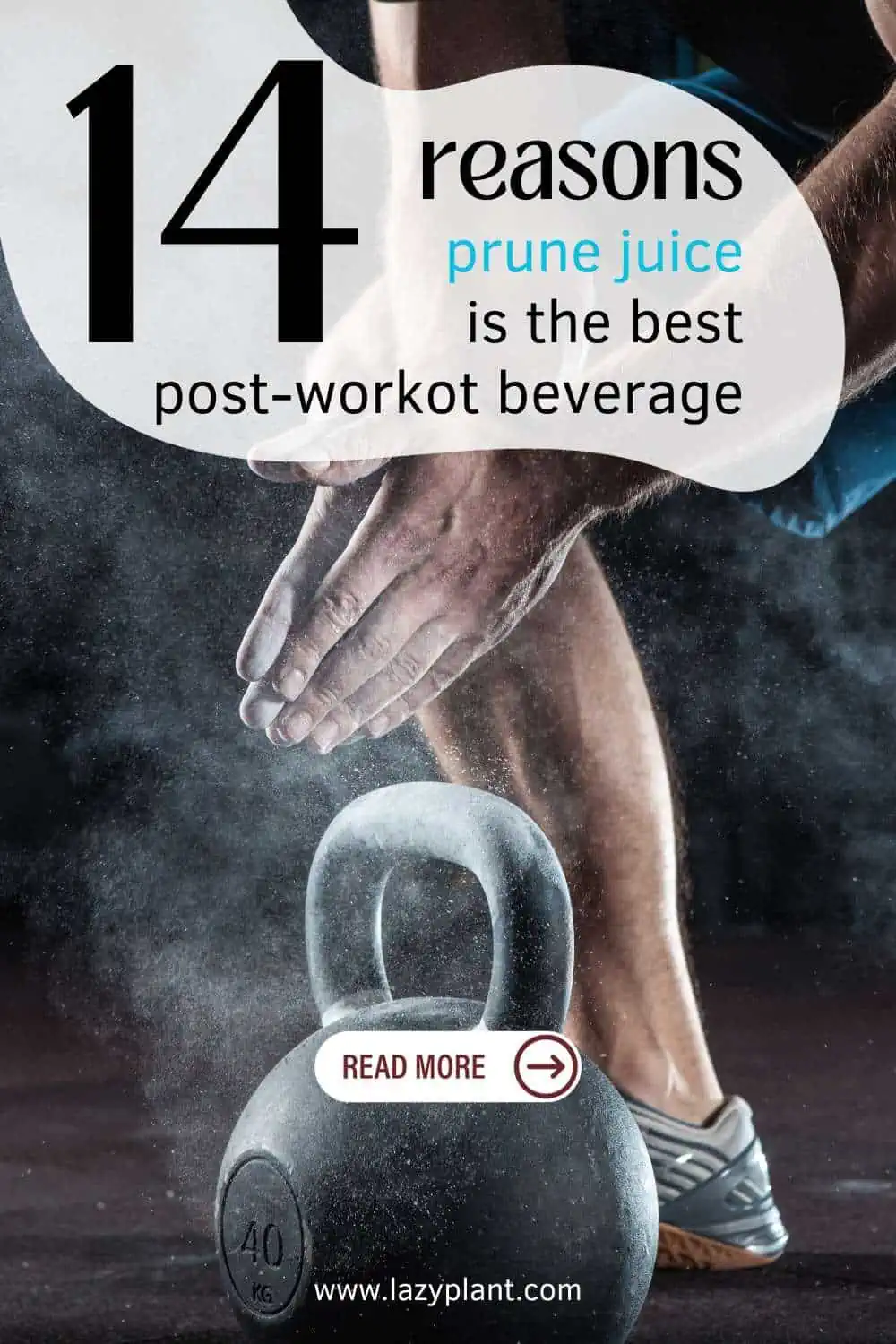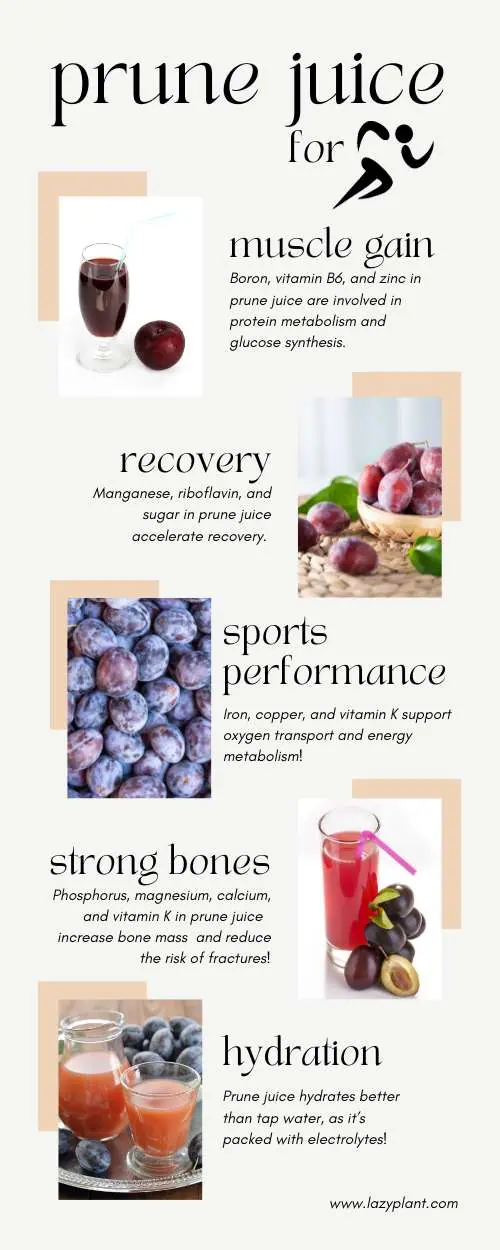Athletes should drink a cup of prune juice after strenuous exercise, as it’s one of the most nutrient-dense beverages! It’s packed with vitamins and electrolytes that accelerate recovery, enhance muscle gain, and promote athletic performance. Both bodybuilding and endurance athletes would benefit from the regular consumption of this superfood.
Benefits of prune juice for bodybuilding athletes
Athletes who train for muscle hypertrophy or strength would benefit from the consumption of prunes or prune juice.
Supports muscle gain
Boron
Prune juice is the richest food in boron. Just a cup provides more boron than most people get in a day! It contains about 1.43 mg of boron, while most adults consume less than 1.35 mg per day from their diet.[1]
Getting high dosages of boron from food is beneficial for bodybuilding athletes because it naturally increases the concentrations and manages the function of steroid hormones, including testosterone.
Vitamin B6
Moreover, prune juice is pretty rich in vitamin B6. A cup provides 40% of the Daily Value.
Vitamin B6 is involved in more than 100 enzyme reactions, mostly concerned with protein metabolism. Vitamin B6 regulates the synthesis and proper use of glucose. Also, it’s crucial for immune function, and the formation of red cells, which play a key role in oxygen transport.[2]
Zinc
In addition, a cup of prune juice provides 5% of the Daily Value of zinc.
Bodybuilding athletes should be very cautious with their daily zinc intake.
Zinc plays a key role in protein synthesis, maintaining protein structure and stability. Actually, one in every ten human proteins is a zinc protein!
Moreover, zinc plays a key role in muscle regeneration and the synthesis of testosterone.
Prunes help build a lean body
Fiber
Athletes who work out for a lean body could eat prunes. As they’re particularly rich in fiber, prunes support weight loss. Especially when combined with foods rich in fiber and protein.
Even prune juice is rich in fiber, though. A cup provides about 2.4 grams of fiber. This dose is almost 9% of the DV.
It even has 1.5 grams of protein!
Drinking reasonable amounts of prune juice, as part of a well-balanced diet, manages appetite, helping build a lean body.

Phosphorus
Additionally, prune juice may attenuate energy intake in subsequent meals due to its high phosphorus concentration. A cup provides 9% of the DV. A diet high in phosphorus has been linked to a decreased risk of obesity.[3]
Vitamin B6
High vitamin B6 dosages are necessary while following a hypocaloric diet for weight loss. It’s implicated in the synthesis of serotonin, which regulates appetite as well as energy metabolism. Prune juice is one of the richest foods in vitamin B6 (40% DV).
Why should endurance athletes drink prune juice?
Prune juice has also many benefits for runners and other endurance athletes. It greatly reduces recovery time and improves endurance performance.
Accelerates recovery
Sugar
Firstly, prune juice accelerates recovery, as it’s naturally rich in sugar. A cup has almost 40 grams of sugar.
Right after strenuous training sessions, athletes should get high amounts of sugar. This is crucial for muscle recovery. Hard-working muscles have depleted glycogen stores. Sugar replenishes them.
Actually, the best time of the day to consume sugar is right after strenuous exercise.
Vitamin B6
Long-distance endurance athletes have high needs of vitamin B6. It has been estimated that runners lose approximately 1 mg of vitamin B6 during a marathon race. For comparison, the recommended daily intake for the general population is 1.3 mg.
A cup of prune juice provides about 40% of the DV. Although athletes have increased vitamin B6 needs, dietary supplementation isn’t necessary if they follow a balanced diet.
Besides prune juice, pistachio nuts, sunflower seeds, chickpeas, hemp seeds, hazelnuts, and walnuts are the richest common foods in vitamin B6.
Manganese
Prune juice is an excellent dietary source of manganese as well. A cup provides 16% of the DV.
Manganese is a cofactor for many enzymes, which are involved in amino acid, cholesterol, glucose, and carbohydrate metabolism.

Manganese deficiency might significantly affect carbohydrate metabolism, causing abnormal glucose tolerance. This can have detrimental effects on endurance performance.[4]
Also, manganese is involved in reactive oxygen species scavenging, bone formation, and immune response.
Riboflavin
Riboflavin in prune juice (13% DV) has also beneficial effects on sports performance. It may enhance early functional recovery after demanding workouts. It’s known to exhibit potent antioxidant properties and protect the muscle tissue from exercise-induced oxidative damage.
Almonds, sunflower seeds, and tahini are the richest common foods in riboflavin.
In fact, tahini is one of the most nutrient-dense foods you can eat daily. It’s a great post-workout snack. It deserves a try.
Improves physical performance
Iron
Most noteworthy, prune juice is the ultimate post-workout beverage for endurance athletes because it’s packed with iron. A serving provides 16% of the DV!
Iron plays an important role in endurance performance. It’s necessary for oxygen transport and energy metabolism. Also, it’s implicated in acid-base balance.
Despite its importance, many athletes are deficient in iron. Especially female endurance athletes. Up to 35% of women have low levels of iron, significantly affecting sports performance.[5]
Additionally, iron imbalances may increase the risk of exercise-associated inflammation.
Copper
Prune juice is also rich in copper. A cup provides up to 18% of the DV.
Copper assists various enzymes in the body that:
- produce energy,
- break down and absorb iron,
- build red blood cells,
- synthesize collagen,
- and rejuvenate connective tissue.
Also, copper is a component of a powerful antioxidant, called superoxide dismutase. This antioxidant enzyme neutralizes harmful free radicals that intense or high-volume exercise produces.[6]
Hence, maintaining normal levels is vital both for endurance and bodybuilding athletes.
Copper is found mainly in bones and muscle tissue.
Vitamin K
Prunes are also pretty high in vitamin K. A medium serving of 5 prunes provides 25% of the DV, while a cup of prune juice provides 7% of the DV.
High vitamin K intake appears to improve fitness levels. It has been linked to significant improvements in cardiac output.[7]
In fact, according to a study, high vitamin K2 dosages from supplements increased maximal cardiac output by up to 12%.[8]
Riboflavin
Moreover, high riboflavin intakes before prolonged running or other athletic events might reduce muscle pain and soreness during and at the end of exercise!
So, athletes could drink prune juice (13% DV per cup) or eat prunes (7% DV per serving) after demanding exercise.
Niacin
Niacin is another B vitamin that appears to improve endurance performance. Among other benefits, niacin may increase glycogen concentrations and alter muscle fiber composition.[9]
We can get high doses of niacin by consuming certain foods. A cup of prune juice provides 12% of the DV, while 5 prunes provide 6% of the DV.
Peanut butter is one of the richest foods in niacin. In fact, a peanut butter and jelly sandwich is an excellent post-workout snack. You could prepare it with a high-quality prune jam!

Strong bones
Furthermore, prune juice supports bone health and reduces the risk of fractures. It’s packed with vitamins and minerals that are necessary for increased bone density:
- Vitamin K increases bone formation, while it substantially decreases bone resorption markers. It’s a key vitamin for bone remodeling.[10]
- Boron is also essential for the growth and maintenance of bone.[11]
- Phosphorus increases bone volume.[12]
- Magnesium also supports bone health. Among other benefits, it enhances calcium absorption.
- Manganese (16% DV) enhances bone formation as well. The human body contains about 10 to 20 mg of manganese, of which 25% to 40% is in bone.
Prune juice contains small amounts of calcium as well. A cup provides 3% of the DV.
Hydrates the body
Moreover, prune juice is a great post-workout beverage because it hydrates the body better than tap water.
We have to replenish both electrolytes and fluids after a training session. Otherwise, electrolyte imbalances may lead to adverse effects, including leg cramps, negatively affecting athletic performance.
Prune juice is rich in electrolytes. A cup provides:
- potassium, 20% DV
- phosphorus, 9% DV
- magnesium, 8% DV
- calcium, 3% DV
We have to replenish lost electrolytes daily.
Potassium
Potassium in particular activates nerve functions, helps muscles to contract and supports normal blood pressure.
Muscle and plasma potassium balance is altered during and after high-intensity dynamic exercise, affecting skeletal muscle contractile performance.
Chronic or acute changes in plasma potassium status can be dangerous to the functioning of the cardiovascular system.[13]
Phosphorus
Elite endurance athletes have much higher needs of phosphorus as compared with the general population. Especially, during training or competition season.
Magnesium
People with increased activity levels have increased needs for magnesium as well.
This essential electrolyte enhances exercise performance by increasing glucose availability in the brain, muscles, and blood while potentially reducing or delaying lactate accumulation in the muscles.
Magnesium may also modulate muscle pain and soreness.
Normal magnesium status is important for all athletes.
Boron in prune juice boosts magnesium absorption.
Can athletes drink prune juice before exercise?
As prune juice is rich in fiber, providing almost 9% of the DV per cup, better to avoid consuming it before a workout. High fiber intake before exercising may cause bloating, gas, stomach cramps, or other adverse effects.
Additionally, prune juice has laxative properties due to its high sorbitol concentrations. You may have the persistent feeling that you need to defecate during exercising which can have detrimental effects on physical performance.
However, you could drink half a cup of prune juice a couple of hours before a training session.
When should an athlete drink prune juice?
Certainly, the best time to drink prune juice is after exercise or in the morning.
Drinking prune juice at breakfast fuels up your muscles. As prune juice has a low glycemic index of 43, it doesn’t spike blood sugar levels.
In addition, vitamins and minerals in prune juice have potent antioxidant actions. They protect the eyes, skin, and hair from oxidative stress that is caused by sun radiation, air pollution, smoking etc.
How much prune juice should an athlete drink?
As a rule of thumb, a cup of prune juice after exercise supports athletic performance, stimulates muscle growth, and accelerates recovery. A cup has about 170 calories and 40 grams of sugar. So, most people shouldn’t consume higher quantities.
After all, the maximum safe daily intake for added sugar is 25 grams. Naturally occurring sugars in fruit juices are also considered added sugars.[14]
Long-distance endurance athletes or bodybuilding athletes in the bulking phase can drink higher quantities, though. They have increased energy needs.
How to drink prune juice for optimum athletic performance?
Certainly, you can enjoy a cup of prune juice after a workout.
You could add it to your favorite post-workout smoothie.
Moreover, you could combine prune juice with other healthy fruit juices. The combination of vitamins, electrolytes, and other antioxidant compounds is good for athletic performance and good health. Nutrients exhibit more potent effects when they act synergistically.
For instance, you can drink prune juice with:
- orange juice or grapefruit juice for vitamin C. Athletes require much higher amounts than people who follow a sedentary life. Lycopene and flavonoids in grapefruit juice have many benefits for athletes as well.
- pineapple juice, as it’s the only natural source of bromelain. This enzyme has potent anti-inflammatory actions.
- cranberry juice, as it’s packed with antioxidant compounds. It helps fight exercise-induced oxidative stress, substantially accelerating recovery.
Prune juice or prunes for a lean body?
It’s a matter of preference. Both prunes and prune juice are high in sugar. So, we have to consume only reasonable amounts.
As prunes are particularly high in fiber, they can play a key role in regulating hunger. If you want to lose weight and build a lean body, prune consumption is better for you.
On the other hand, if you have a normal body weight and want to achieve the best possible athletic performance, drinking prune juice could have huge benefits!
